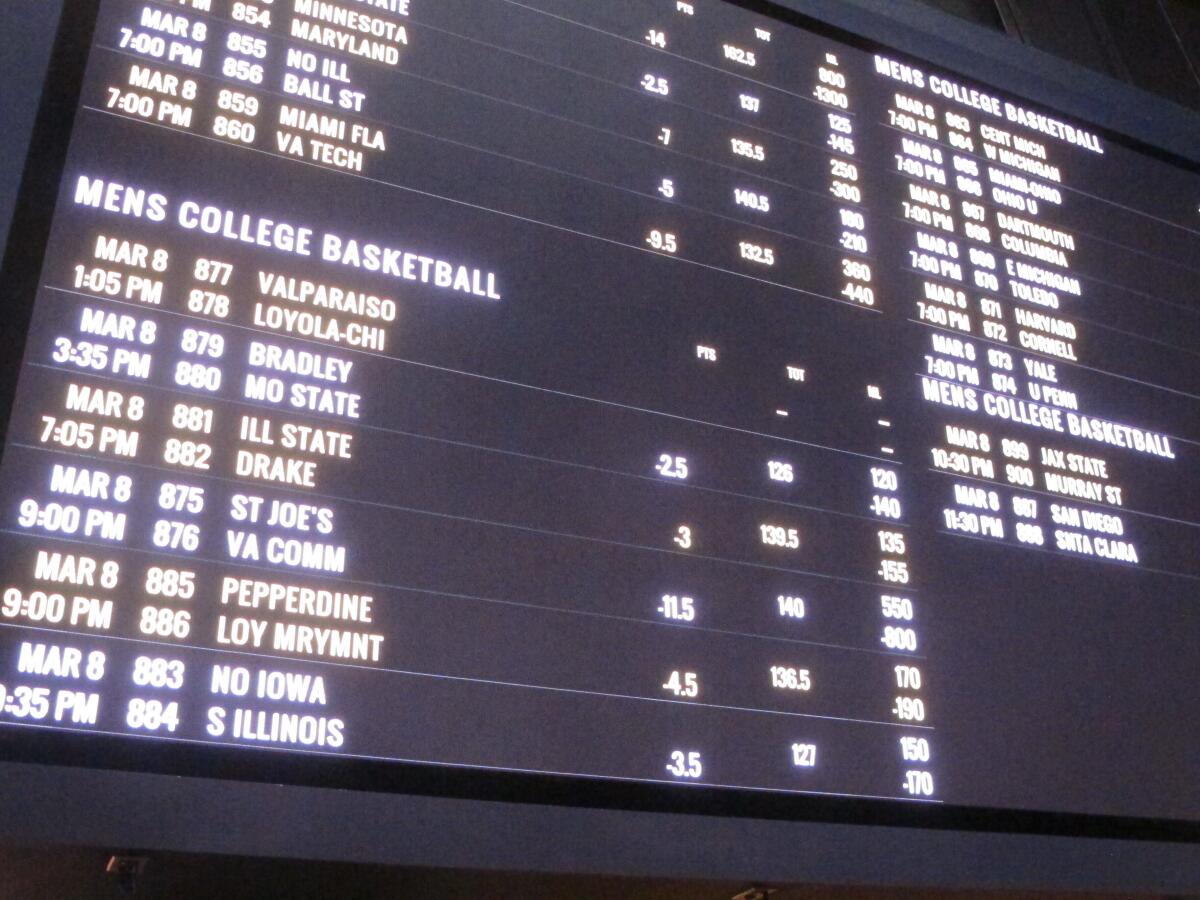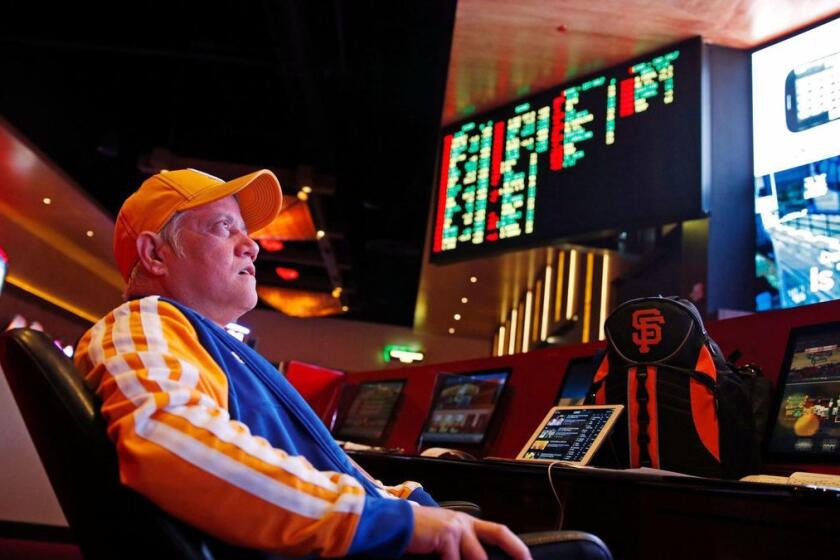California voters lean toward legalizing sports betting in new poll

- Share via
SACRAMENTO — California voters are open to the idea of creating a legal market for betting on college and professional sports but fewer than half of those surveyed in a new poll are sure of their support, an unsettled finding that serves as a prelude to a multimillion-dollar political battle in November.
A poll released Wednesday by UC Berkeley’s Institute of Governmental Studies and co-sponsored by the Los Angeles Times finds 45% of voters surveyed would support amending the California Constitution to allow sports betting. One-third of voters said they are opposed to such an effort while the remaining 22% of respondents — more than 1 in 5 — are undecided.
The poll did not ask voters to weigh in on any of the details of how California would establish legal sports betting. As many as three ballot measures on the topic could appear on the statewide ballot in November, each envisioning a different business model. The proposals are backed by rival groups promising to spend what could be a record amount of campaign cash to prevail on election day.
“It’s just anybody’s guess right now how an initiative might fare,” said Mark DiCamillo, the institute’s survey director. “They might be able to win if they can prove a benefit to the state and a lack of harm to the larger population.”
Efforts to legalize sports betting in California have been in the works since 2018, when the U.S. Supreme Court struck down a federal law that banned all states except Nevada from establishing sports betting operations. The legal challenge was brought by New Jersey in its bid to boost the sagging fortunes of its race tracks and Atlantic City casinos.
Four years later, the industry has kicked into high gear. More than 30 states, including all of those that share a border with California, have already authorized sports betting operations. But no state offers as lucrative a market as the one estimated to exist in California. Last fall, an analyst with a national gaming research firm told The Times the state could generate more than $3 billion a year in sports betting revenue if voters legalize the practice.
California voters could be asked next year whether to legalize betting on professional and college sports. Tribes, card club owners and online gaming companies are all vying to get a piece of the action.
The Berkeley poll suggests that groups seeking to legalize sports betting will begin the campaign season in a much stronger position than opponents. Very few subsets of California voters were mostly opposed to the idea of the new legal gambling enterprise. And the poll found support in roughly equal measures from both Democrats and Republicans.
“It is rare these days for a political issue to not be seen as partisan,” said Eric Schickler, co-director of the institute. “But legalizing sports betting in California appears to be one of them, at least for the time being.”
One ballot measure to legalize sports betting in California has already qualified for the Nov. 8 election. Backers of two additional proposals are now collecting voter signatures in an effort to also qualify. State law allows proponents of a ballot initiative to withdraw their measure any time before the final deadline on June 30.
The three sports betting proposals would present voters with a complex tangle of public policy and political power.
The measure that has qualified was drafted in late 2019 and submitted by the chairmen of four of California’s most successful Native American tribes with gaming interests. It seeks to establish in-person sports betting at tribal casinos and horse racing tracks in the state and would impose a 10% tax on those operations to fund gambling addiction treatment and enforcement programs, as well as broader state government services.
A large coalition of tribes and horse racing interests contributed money to qualify the measure. The largest donations to date have come from three tribes: the Agua Caliente Band of Cahuilla Indians in Palm Springs, the Barona Band of Mission Indians in Lakeside and the Yocha Dehe Wintun Nation in rural Yolo County.
Californians would be able to legally bet on Lakers, Dodgers and Rams games at tribal casinos and horse-racing tracks under an initiative for the November 2022 ballot.
Card club operators oppose the measure because it includes a provision that could expand the rights of club employees and others to file civil lawsuits against the companies. Their campaign committee includes sizable contributions from the California Commerce Club and the Gardens Casino, both in Los Angeles County.
What the initiative does not allow, however, is online sports betting, one of the most lucrative parts of the growing industry. Californians are already being encouraged by TV ads to log on and place bets — even though state law makes it illegal to wager on the outcomes of any sports event. In October, a coalition led by national gaming companies DraftKings and FanDuel filed a second initiative that would allow online sports betting, with sizable licensing fees that would fund new homelessness and mental health programs in the state.
“Our measure is the only one that would guarantee hundreds of millions each year in solutions to homelessness and mental health support,” said Nathan Click, a spokesman for the initiative sponsored by the online gaming companies. “We have found Californians are enthusiastic about it and the housing and mental health solutions it would provide the state.”
Representatives of several other sports betting campaigns did not respond to requests for comment.
None of the proposals would allow bets to be placed on sports games involving high school athletes, nor would they allow betting on California collegiate teams. Legal bets could be placed, however, on college tournaments in which those teams participate — as long as the bet isn’t on the outcome of a game involving an in-state team.
The arrival of the national online gaming powerhouse companies drew criticism from Native American tribes. In December, a new coalition of tribes submitted a third initiative, one that would allow tribal casinos to add online wagering operations and would offer a similar infusion of cash for homelessness and health programs.
The campaign that lies ahead is likely to be expensive. DraftKings and FanDuel launched their initiative last year with $100 million in contributions from various national gaming platforms. A group led by the San Manuel Band of Mission Indians in San Bernardino County has raised more than $40 million this year to oppose the DraftKings initiative and support the newest proposal.
Kathy Fairbanks, a spokesperson for the in-person sports betting measure that qualified for the ballot, said the campaign’s own surveys show that Californians may be reluctant to support legalizing internet bets.
“Our polling consistently shows strong support for in-person sports gaming in tribal casinos and strong opposition to online sports wagering,” she said.
California voters have faced competing propositions on the same topic before but rarely with campaigns as well funded as those involved this year. The ballot measure championed by DraftKings and FanDuel includes a provision that says its proposed constitutional amendment and the original tribal proposal could both become law because they largely cover separate parts — in-person and online — of the sports betting industry.
But the second tribal initiative seeks a piece of the online market. And the two online betting measures state that should both be approved by voters, the one with the most “yes” votes would prevail.
The Berkeley/L.A. Times poll asked voters a question that could provide the foundation for the political brawl that lies ahead: How much interest do you have in professional sports? A plurality of those surveyed — 47% — said they have either some or only a little interest, perhaps explaining the similarly restrained support for the idea of legalizing sports gambling.
“If you’re a sports fan, you think the whole world around you is made up of sports fans,” DiCamillo said. “They will have to convince those who aren’t sports fans if they want an initiative to pass.”
More to Read
Sign up for Essential California
The most important California stories and recommendations in your inbox every morning.
You may occasionally receive promotional content from the Los Angeles Times.














